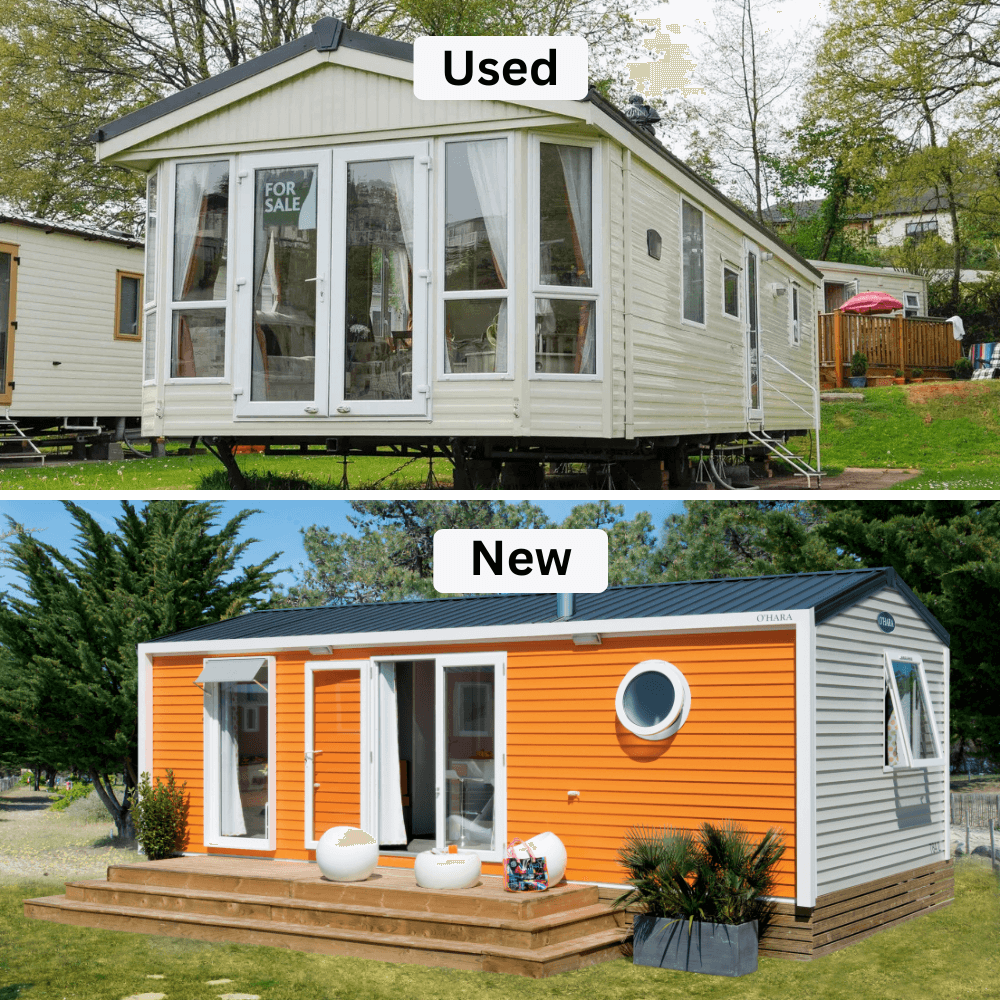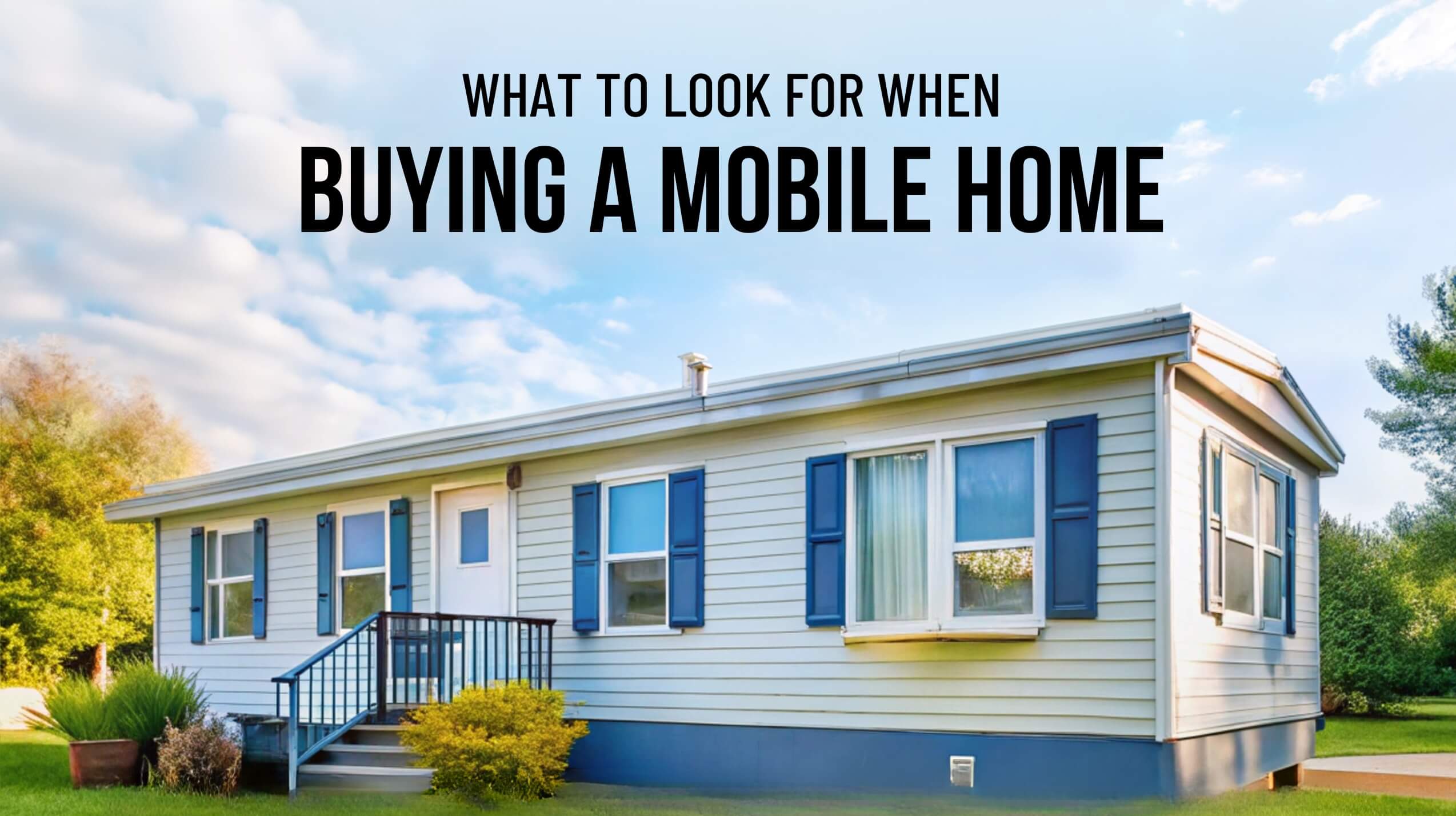What to Look for When Buying a Mobile Home
Buying a mobile home is a significant investment, whether it’s for full-time living, a vacation spot, or even rental purposes. Mobile homes offer affordability and flexibility, but like any real estate purchase, there are essential factors to consider. Knowing what to look for when buying a mobile home can help you avoid costly mistakes and ensure that your home fits your lifestyle and long-term goals.
In this guide, we’ll explore the key considerations when buying a mobile home, including location, build quality, financing, and more.

1. Determine the Location
Location is one of the most critical factors when buying any type of home, including mobile homes. Mobile homes are often placed in communities, parks, or on private land, and each option has its advantages and challenges. Ultimately, evaluating these factors is essential for aligning your choice with your lifestyle, budget, and long-term goals.

i. Mobile Home Parks
If you decide to place your mobile home in a park, consider the park’s reputation, amenities, and community rules. Make sure to understand the fees associated with renting a lot and the services included, such as maintenance, utilities, and garbage collection.
ii. Private Land
If you’re placing the mobile home on private land, ensure that the land is zoned for mobile homes and that you understand local building codes. Also, factor in additional costs for site preparation, utility hook-ups, and land improvements.
iii. Accessibility
Evaluate how close the location is to essential services like schools, hospitals, grocery stores, and public transportation.
2. Choose Between New or Used Mobile Homes
Another key decision is whether to buy a new or used mobile home, as each has pros and cons. New mobile homes offer modern features, customization, and warranties but are more expensive upfront. Used homes are more affordable with faster move-in times but may require more maintenance and lack updated amenities. Carefully weighing these factors helps ensure the best fit for your budget and lifestyle.

i. New Mobile Homes
Buying new ensures that you get a home that meets current construction standards, is energy-efficient, and often comes with warranties. New homes can be customized to suit your preferences, but they tend to be more expensive than used models.
ii. Used Mobile Homes
Buying a used mobile home can be more affordable, but it’s essential to thoroughly inspect the home’s condition. Older homes might require significant repairs or upgrades to meet current building codes or your personal standards.
3. Inspect the Mobile Home’s Construction Quality
The construction quality of the mobile home is crucial for long-term comfort and safety. It’s important to examine the materials used, such as the durability of the foundation, roofing, and insulation, as these directly impact the home’s energy efficiency and structural integrity. Additionally, check if the home meets HUD (Housing and Urban Development) standards, which ensure proper construction practices. Here’s what to look for when buying a mobile home in terms of build quality.

i. Structure and Foundation
Check if the mobile home is well-anchored to its foundation. A proper foundation ensures stability and protection from harsh weather conditions. Ensure the home complies with HUD (U.S. Department of Housing and Urban Development) standards, which set strict regulations for mobile home construction.
ii. Roof and Siding
Inspect the roof for leaks, sagging, or water damage. Look for durable materials such as metal or shingle roofing. Examine the siding for signs of wear, cracks, or warping, which can indicate underlying problems.
iii. Plumbing and Electrical Systems
Ensure that the plumbing is in good condition, with no leaks or outdated materials. The electrical system should be up to code and able to handle the modern electrical demands of appliances, heating, and cooling systems.
iv. Insulation and Energy Efficiency
Check the insulation in walls, floors, and ceilings to ensure the home will be energy-efficient, reducing heating and cooling costs. Mobile homes with energy-efficient windows, doors, and HVAC systems can save you money in the long run.
4. Understand Financing Options
Financing a mobile home can differ from traditional home mortgages, and your ability to secure financing depends on several factors such as the age, condition, and location of the mobile home. Additionally, some lenders may have specific requirements for mobile home loans, including the type of foundation and whether the home is considered personal property or real estate. Here’s what to keep in mind: researching different financing options like FHA, VA, or personal loans, and comparing terms to find the best fit for your financial situation.

i. Chattel Loans
Mobile homes that are placed on leased land, such as in a park, are often financed with a chattel loan. These loans generally come with shorter terms and higher interest rates than conventional mortgages.
ii. FHA Loans
If your mobile home is permanently attached to land you own, you may qualify for an FHA loan, which often has better terms than chattel loans. Be sure the home meets the necessary criteria for this type of loan, including meeting HUD standards.
iii. Personal Loans
For buyers purchasing a used mobile home at a lower price, a personal loan may be an option. However, interest rates may be higher compared to traditional home financing.
iv. Check Your Credit Score
Lenders will examine your credit score and financial history to determine your eligibility for loans and interest rates. A higher credit score typically leads to more favorable financing options, such as lower interest rates and better loan terms.
5. Examine Resale Value
Mobile homes depreciate in value differently than traditional homes. It’s important to consider the potential resale value of the mobile home in the future. Here’s what to look for when buying a mobile home to ensure better resale value:

i. Age of the Home
Newer homes will typically hold their value longer than older homes. Mobile homes built after 1976, when HUD standards were enacted, are more likely to retain value compared to older models.
ii. Location
Homes in well-maintained parks or on private land with access to essential services tend to retain value better than those in less desirable areas.
iii. Upkeep and Maintenance
A mobile home that has been well-maintained, with regular repairs and updates, will likely have a higher resale value than one that has been neglected.
6. Check Park or Community Rules
If you’re placing your mobile home in a park or community, be sure to understand the rules and regulations. Some parks may have strict guidelines about the appearance, upkeep, and modifications allowed to homes within the park. They may also have restrictions on the types of homes allowed or the ages of residents (e.g., 55+ communities). Be sure to review the lease agreement and ask questions to clarify any uncertainties.
7. Consider Insurance and Warranty
Insurance for a mobile home differs from traditional homeowners insurance, as mobile homes are often considered more susceptible to certain risks like weather damage. Mobile home insurance typically covers the structure, personal property, and liability, but premiums can vary significantly depending on factors such as the home’s location, age, condition, and whether it is on private land or in a park. It’s important to compare coverage options and providers to ensure you get the best protection for your investment.
i. Mobile Home Insurance
Be sure to shop around for insurance policies and understand what is and isn’t covered. If the home is located in an area prone to natural disasters like floods or hurricanes, expect higher premiums.
ii. Warranties
New mobile homes often come with warranties that cover structural defects, appliances, and other issues for a set period. If you’re buying used, check whether any existing warranties are transferable.
8. Plan for Long-Term Maintenance
Mobile homes, like traditional homes, require ongoing maintenance to stay in good condition and retain their value. Regular tasks such as roof inspections and HVAC servicing are essential for longevity. When buying a mobile home, consider not only the initial cost but also the long-term upkeep to keep it in optimal shape. Factoring in maintenance helps you budget more effectively and avoid unexpected expenses.

i. Skirting and Ventilation
Skirting protects the underside of the mobile home and provides insulation. Check if the skirting is in good condition and well-ventilated to prevent moisture buildup, which can lead to mold and structural damage.
ii. HVAC Systems
Inspect the heating and cooling systems, as mobile homes often rely on energy-efficient systems to maintain comfortable temperatures. Make sure they are in good working condition and consider how easy it will be to maintain or replace them.
iii. Exterior and Roof Maintenance
Regularly inspect the roof and exterior for wear and tear. If repairs or updates are needed, factor in these costs when making your purchase decision.
Frequently Asked Questions (FAQs)
Here are five FAQ questions for your blog post on “What to Look for When Buying a Mobile Home”
1. What should I consider when choosing a location for a mobile home?
When selecting a location, evaluate whether you’ll place your mobile home in a park, community, or on private land. Consider proximity to essential services, community amenities, and zoning laws.
2. Is it better to buy a new or used mobile home?
New homes offer modern features and warranties, but they’re more expensive. Used homes are more affordable but may require repairs and inspections to ensure they meet safety and quality standards.
3. What are the financing options for purchasing a mobile home?
Financing options vary based on whether the mobile home is placed on leased land or owned property. Common choices include chattel loans for homes on rented land, FHA loans for homes attached to private property, and personal loans for lower-cost homes. Eligibility is influenced by factors such as your credit score and the type of property being financed.
4. How can I evaluate the construction quality of a mobile home?
Inspect the foundation, roof, plumbing, and electrical systems. Look for homes built to HUD standards, with proper insulation and energy-efficient features, to ensure long-term durability and comfort.
5. Do mobile homes retain resale value?
Mobile homes generally depreciate faster than traditional homes. To retain value, consider the home’s age, location, and maintenance history. Homes on private land or in well-maintained communities tend to hold value better.
Final Thoughts:
What to Look for When Buying a Mobile Home
Buying a mobile home can be an excellent option for many people, offering affordability and flexibility. However, it’s important to know what to look for when buying a mobile home to ensure that you make a sound investment. From location and construction quality to financing options and long-term maintenance, understanding the key factors will help you find a mobile home that fits your needs and lifestyle. By carefully considering all these elements, you can confidently buy a mobile home that will provide value and comfort for years to come.

